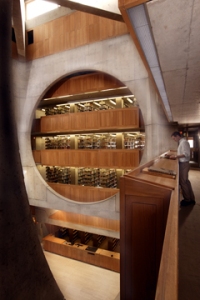Sarah Robinson’s Architecture is a Verb
Written and curated by Dr. Jon Sakata, Friends of the Library Summer Faculty Fellow

I was introduced to the Italian-based architect, Sarah Robinson, through a dear mutual friend and artistic muse, the Boston-based painter, Deborah Barlow. Soon the three of us would be involved as contributing panelists (together with a stellar array of fellow artists, curators, art historians, critics and philosophers) in an online symposium, Thingly Affinities: Rethinking Aesthetic Form for a Posthumanist Future, organized by the artist-writer-curator, Taney Roniger, which took place December 4-13, 2020. The conference involved an ongoing dialogue through threads of written commentary by the symposium panelists on richly thoughtful and provocative prompts by Roniger. A highlight of Thingly Affinities was an opportunity for all the panelists to have a group zoom dialogue with Robinson on her new book, Architecture is a Verb (Routledge, 2021).
Both Barlow and Roniger would thereafter respectively pen two profoundly beautiful, richly considered and cast reviews of the book; and long story made short, an invitation of my writing a review of Architecture is a Verb emerged, to my delight. Retiring Academy Librarian, Gail Scanlon, and Associate Director of the Library, Beth Rohloff, kindly provided this blog as a platform to publish the review as part of my Friends of the Library Summer Faculty Fellowship. While the fellowship supported preparations for this fall’s transformative Class of 1945 Library 50th anniversary celebration; it also allowed me the time to develop the scope and process of this review.
For an extended period, I intended to provide a prose overview of the book’s rich array of interventions, concepts, perceptions, cares. I was very attracted to Robinson’s exploration of how deep embodiment and attunement to the vast range of planetary non-human and human ways of living, comingling, co-evolving – interweaving diverse forms of interaction, situatedness and dialogic growth – can nurture practices architectural and well beyond. During my cycles of (re-)reading Architecture is a Verb, I found particular resonance with one of Robinson’s focal concentrations: the value, beauty, vein of smallness. Born from this, instead of writing a review (alone) concerning the book’s entirety, I began to entreat the idea of inviting my students – as well as some colleagues and friends from the Academy and beyond – to consider collaborating on an unusual form of re-viewing the book: to take a short excerpt of the whole and co-create a fifty-fold cycle of tankas to form a renga collection based on this small but nutrient-rich ‘plot of land’ in the book’s total acreage. In the symposium conversation on her book, Robinson emphasized that she hoped her book serve as a toolbox for readers to carry forward their own projects and practices. I have taken this hope to heart to both share this multiplicary re-view here as well as contribute to the celebratory exhibition, SYN, as a collective poetic garland that now lines Floor 2M of the Class of 1945 Library’s Rockefeller Hall atrium. My gratitude in the multiple to each and all the students, colleagues and friends who have brought this cycle to fruit and fruition, as well as to Gail Scanlon and Beth Rohloff for both the physical and virtual platform to share it now with a wider public.

1,550: A fifty-fold celebratory renga cycle (2021) by Academy students and employees + guest architects and artists
1,550 is a co-created collection of tankas – five lines of 5-7-5-7-7 sound units or syllables, where the initial three lines of 5-7-5 were created by each invited collaborator and Jon Sakata then responded with a unique 7-7 couplet – forming a celebratory fifty-fold renga cycle. The prompt given to collaborators was to read a two-paragraph excerpt from a chapter in Robinson’s book entitled, “Extended Organisms— Surrogate Bodies”, and then, turning their reflection upon the Class of 1945 Library.
Photo captions: Student authors with their Renga poems on display.












































About the Author: Dr. Jon Sakata is an Instructor of Music at Phillips Exeter Academy and Concert Musician and Transdisciplinary Artist. Dr. Sakata served as a Friends of the Library Summer Faculty Fellow in 2021.
